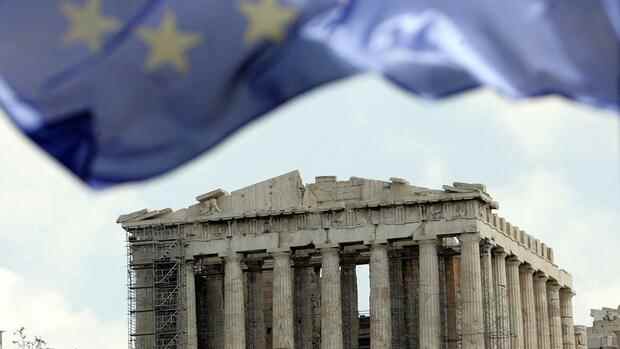In 2015, after a long struggle, Greece agreed on a third aid package with the euro countries and the IMF.
(Photo: dpa)
Athens Greece wants to pay off its debts to the International Monetary Fund (IMF) by the end of March. It is about credit installments of the equivalent of 1.8 billion euros, which are normally due for repayment by 2024.
Also by the end of the first quarter, Finance Minister Christos Staikouras intends to prematurely repay further loans amounting to 5.3 billion euros. These are bilateral loans that Greece’s euro partners granted to the country as part of the first bailout package put together in 2010. They are normally due by 2023.
Greece can finance the 7.1 billion euro repayment from reserves. Athens has a liquidity buffer of around 40 billion euros. According to government circles, the aim of repaying the loans is to reduce the debt ratio.
According to calculations by the EU Commission, Greece had the highest national debt of all EU countries at 202.9 percent of gross domestic product (GDP) at the end of 2021. Above all, the repayment of the IMF loans, which have higher interest rates than the loans from the euro partners and the ESM euro stability fund, will ease the burden of servicing debt.
Top jobs of the day
Find the best jobs now and
be notified by email.
The early repayment is a signal to the financial markets. After Greece was still on the brink of bankruptcy in mid-2015, the country can now refinance itself on the market. Two weeks ago, the Greek debt agency placed a ten-year bond with a volume of three billion euros. The coupon is 1.75 percent. The issue was five times oversubscribed.
The former crisis country owes its regained creditworthiness above all to the European Central Bank’s (ECB) bond-buying program and the fact that around 75 percent of Greece’s national debt is with public creditors such as the ESM.
Also a symbolic step
In the crisis years from 2010 to 2018, aid loans of 289 billion euros flowed to Greece. 32 billion came from the IMF. With the repayment now planned, Athens is detaching itself from the drip of the Monetary Fund. This is an important symbolic step. Because the IMF played a key role in the rescue of Greece from the start.
According to government circles, the aim of repaying the loans is to reduce the debt ratio.
(Photo: Reuters)
As early as 2008, the fund had written a scathing report on the state of Greek public finances. He forecast the debt ratio to rise to 800 percent of GDP. The then conservative Greek Prime Minister Kostas Karamanlis managed to prevent the report from being published. But that only brought a reprieve. 18 months later, Greece lost its access to the capital market.
Secret meeting in the kitchen of a Davos hotel
Socialist Prime Minister Giorgos Papandreou, who was elected in October 2009, initially sounded out aid options at the IMF. During the World Economic Forum in January 2010, Papandreou had a secret meeting with Dominique Strauss-Kahn, then head of the IMF, in the kitchen of a hotel in Davos. Standing, the two discussed the possibilities of an aid program in the midst of scurrying cooks and waiters.
Strauss-Kahn rejected the IMF’s own aid program, but promised to convince the Europeans of the need for a joint rescue plan and, above all, to get the country on board that was essential: Germany.
Conversely, in Berlin, Chancellor Angela Merkel and her finance minister, Wolfgang Schäuble, insisted that the Monetary Fund be closely integrated into the Greece program, because the EU did not have crisis management instruments at the time.
The first aid package put together at the beginning of May 2010 bore the signature of the IMF with its rigorous austerity requirements and thus met Berlin’s expectations. But the fund recognized the conceptual weaknesses of the Greek bailout earlier than the EU and the ECB.
The focus was on austerity targets while the program neglected structural reforms. It also turned out to be a mistake that the politicians of the euro countries repeatedly delayed a haircut recommended by many experts in 2010 out of consideration for the European banks. It only came out in February 2012, and its impact quickly wore off.
Concern about Greece’s debt sustainability runs like a red thread through the IMF’s expertise. The fund therefore no longer participated in the third rescue package launched in the summer of 2015. However, he remained on board as one of the four creditor institutions, mainly at the insistence of Berlin, alongside the EU Commission, the ECB and the ESM.
The aid program ended in August 2018 with the payment of the last loan installment. Athens remained under stricter fiscal supervision by the EU. It is expected to end this summer. However, the Greeks still have to bear the legacy of the debt crisis for almost half a century: the repayment of the aid loans from the ESM and its predecessor EFSF will run until 2070.
More: Greek shipowners are profiteers from the gas crisis
